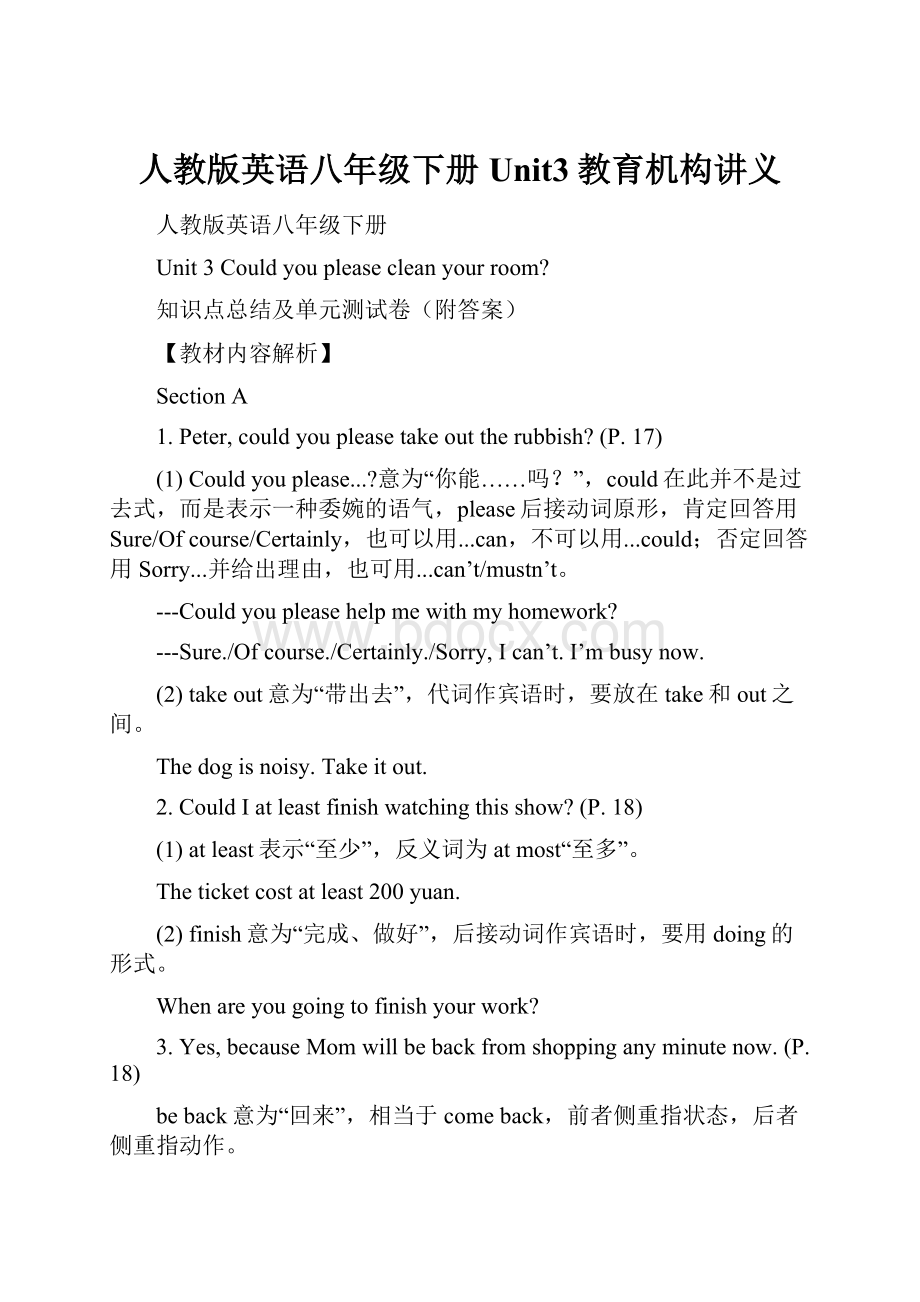人教版英语八年级下册Unit3教育机构讲义.docx
《人教版英语八年级下册Unit3教育机构讲义.docx》由会员分享,可在线阅读,更多相关《人教版英语八年级下册Unit3教育机构讲义.docx(28页珍藏版)》请在冰豆网上搜索。

人教版英语八年级下册Unit3教育机构讲义
人教版英语八年级下册
Unit3Couldyoupleasecleanyourroom?
知识点总结及单元测试卷(附答案)
【教材内容解析】
SectionA
1.Peter,couldyoupleasetakeouttherubbish?
(P.17)
(1)Couldyouplease...?
意为“你能……吗?
”,could在此并不是过去式,而是表示一种委婉的语气,please后接动词原形,肯定回答用Sure/Ofcourse/Certainly,也可以用...can,不可以用...could;否定回答用Sorry...并给出理由,也可用...can’t/mustn’t。
---Couldyoupleasehelpmewithmyhomework?
---Sure./Ofcourse./Certainly./Sorry,Ican’t.I’mbusynow.
(2)takeout意为“带出去”,代词作宾语时,要放在take和out之间。
Thedogisnoisy.Takeitout.
2.CouldIatleastfinishwatchingthisshow?
(P.18)
(1)atleast表示“至少”,反义词为atmost“至多”。
Theticketcostatleast200yuan.
(2)finish意为“完成、做好”,后接动词作宾语时,要用doing的形式。
Whenareyougoingtofinishyourwork?
3.Yes,becauseMomwillbebackfromshoppinganyminutenow.(P.18)
beback意为“回来”,相当于comeback,前者侧重指状态,后者侧重指动作。
Shehasbeenbackfortwodays.
Youcamebackverylatelastnight.
4.Andshewon’tbehappyifsheseesthismess.(P.18)
mess用作名词,表示“杂乱、不整洁”,常用的短语为:
makeamess“搞得一团糟”;inamess“一团糟”。
Thekidsmakeamessinthebedroom.
Alltheroomsareinamess.
5.TheminuteIsatdowninfrontoftheTV,mymomcameover.(P.19)
(1)theminute意为“一……就”,用来引导时间状语从句,相当于themoment或者assoonas。
Iwanttoseehertheminuteshearrives.
(2)comeover意为“过来”。
Canyoucomeovertomorrow?
6.YouwatchTVallthetimeandneverhelpoutaroundthehouse!
(P.19)
allthetime意为“反复、总是”,强调某段时间内一直在进行和发生的事情。
Ihaveadogandacat.Theyfightallthetime.
7.I’mjustastiredasyouare!
(P.19)
当我们要表示双方某方面(如年龄、身高等)程度相同或不同时,常用as…as或notas/so…as结构,表示“和……一样”或“和……不一样”。
如:
MaryisascarefulasLinda.玛丽和琳达一样仔细。
HedoesnotrunasfastasTom.他跑步没有汤姆快。
8.Foroneweek,shedidnotdoanyhouseworkandneitherdidI.(P.19)
neitherdidI是“Neither/nor+助动词/be动词/情态动词+主语”结构,表示前者所描述的否定情况同样适用于后者,neither在此用作副词,表示“也不”。
---Idon’tlikethisdress.
---NeitherdoI.
9.MymomcameoverassoonasIsatdowninfrontoftheTV.(P.19)
assoonas引导时间状语从句,表示“一……就……”,要遵从“主将从现”的原则,即主句用一般将来时,从句用一般现在时。
Iwillgoassoonasshearrives.
10.CouldIhangoutwithmyfriendsafterthemovie?
(P.20)
hangout意为“闲逛、闲荡”。
Heishangingoutwithhisfriends.
11.Couldyoupleasepassmethesalt?
(P.20)
passsb.sth.相当于passsth.tosb.“把某物递给某人”。
Passmethebook,please.=Passthebooktomeplease.
12.CouldIborrowthatbook?
(P.20)
borrow此处是及物动词,表示“借进来”,反义词是lend,borrow...from...“从……借入……”。
Ioftenborrowbooksfromthelibrary.
Youcanborrowsomemoneyfromyourelderbrother.
13.Couldyoulendmesomemoney?
(P.20)
lend表示“借出去”,与borrow“借进来”相对,常用的结构为:
lendsb.sth.=lendsth.tosb.“把某物借给某人”。
Heoftenlendsothershiscar.
=Heoftenlendhiscartoothers.
14.I’llfinishmyhomeworkwhileyouhelpmewiththedishes.(P.20)
when和while引导时间状语从句均表示“当……时候”,when既可以指“时间点”,与瞬间动词连用,也可以指“时间段”,与延续性动词连用(=while)。
while表示时间段,因此,while从句的谓语动词要用延续性动词,as强调两个动作同时发生,表示“一边……一边……”。
Whenhecamein,hismotherwascooking.
When(While)wewereatschool,wewenttothelibraryeveryday.
Pleasedon'ttalksoloudwhileothersareworking.
Tom’sbrotherwasplayingthecomputergameswhileTomwasstudyinghard.
Katelistensmusicasshewalksinthepark.
SectionB
1.Houseworkisawasteoftheirtime.(P.22)
awasteof意为“浪费……”,其中waste是名词,意为“浪费”。
Playingcomputergamesisawasteoftime.
2.Theshouldspendtheirtimeonschoolworkinordertogetgoodgradesandgetintoagooduniversity.(P.22)
(1)spend的用法
sb.spend+时间/金钱+onsth.“在某事上花费多长时间或者多少钱”
Themanspentthewholedayonhisspeech.
Thefamilyspent10,000dollarsontheirtrip.
sb.spend+时间+(in)doingsth.“花费多长时间做某事”
Theboyhasspenttwohoursplayingthecomputergames.
【拓展】辨析spend,pay,take和cost
spend
主语是人
spend...onsth./spend...(in)doingsth.
pay
主语是人
payforsth./paysb.forsth.
take
主语是it
Ittakessb.+时间+todosth.
cost
主语是物
sth.costssb.+金钱
(2)inorderto意为“为了……”后面跟动词不定式,作目的状语。
inorderto可位于句中或者句首,inordernottodosth.意为“为了不做某事”。
Tomgotupearlyinordertocatchthefirstbus.
Inordernottomakehismotherangry,hedecidedtogiveupplayingcomputergames.
3.Also,whentheygetolder,theywillhavetodohouseworksothereisnoneedforthemtodoitnow.(P.22)
thereisnoneedforsb.todosth.意为“对某人来说没有必要做某事”。
Thereisnoneedforyoutostartoffsoearly.
4.Itistheparents’jobtoprovideacleanandcomfortableenvironmentathomefortheirchildren.(P.22)
(1)Itis+名词+todosth.表示“做某事是……”,其中的it为形式主语,后边的动词不定式才是真正的主语。
It’smyjobtolookafteryou.
(2)provide表示“提供”时,常用的结构为:
providesb.withsth.或者providesth.forsth.“为某人提供某物”;offer也表示“提供”,但结构有所不同,常用于“offersb.sth.或者offersth.tosb.”结构中,意为“为某人提供某物”。
Thegovernmentprovidedalotoffoodandclothesforthefloodedarea.
=Thegovernmentprovidedthefloodedareawithalotoffoodandclothes.
5.Anyanyway,Ithinkdoingchoresisnotsodifficult.(P.22)
(1)anyway用作副词,表示“而且、加之”,也可以表示“即使这样、无论如何”。
It’sexpensiveandanywaythesizeistoosmall.
Anyway,weshouldhaveatry.
(2)doingchores是动名词,在句中用作主语,谓语动词用单数形式。
Doingmorningexerciseisgoodforus.
6.Ithinkitisimportantforchildrentolearnhowtodochoresandhelptheirparentswithhousework.(P.22)
(1)本句结构为“It’s+adj.+forsb.+todosth.”结构,意为“做某事对某人来说……”,此结构中的形容词多为描述事物特征的词,如easy,important,dangerous,necessary等。
例如:
Itisimportantforyoutostudyhard.
Itisnoteasytolearnaforeignlanguage.
【拓展】It’s+adj.+ofsb.+todosth.意为“某人做某事是……的”,此结构中的形容词多是kind,nice,right,wrong,clever,foolish,polite等描述行为者性格、品质的词。
Itisverykindofyoutolendmesomuchmoney.
(2)howtodochores是“特殊疑问词+动词不定式”结构,作learn的宾语,动词不定式常与what,who,how,where,when等特殊疑问词连用,在句中作主语、宾语、表语等。
Whentostartisnotdecidedyet.
Thequestionsiswhattodonext.
7.Childrenthesedaysdependontheirparentstoomuch.(P.22)
dependon/upon意为“取决于……;由……决定;依靠”
Youcanacceptorrefusethegift.Itdependsonyourpersonalchoice.
Weshouldn’talwaysdependonourparents.
8.Doingchoreshelpstodevelopchildren’sindependenceandteachesthemhowtolookafterthemselves.(P.22)
independence用作不可数名词,表示“独立、自主”,形容词为independent,意为“独立的”。
Hewasafraidoflosinghisindependence.
9.Sincetheyliveinonehousewiththeirparents,theyshouldknowthateveryoneshoulddotheirpartinkeepingitcleanandtidy.(P.22)
(1)since此处表示“因为、既然”,引导原因状语从句,常位于句首。
Sinceyoudon’tknowtheboy,Iwillasksomeoneelse.
(2)doone’spartin(doing)sth.意为“尽自己的职责去做某事”。
Thepresidentaskedeverycitizentodohispartinsavingwater.
10.Asaresult,heoftenfellillandhisgradesdropped.(P.22)
asaresult意为“因此、结果”,在句中作状语;asaresultof表示“由于”,后接名词或者代词,相当于becauseof。
Hegotupverylatetoday.Asaresult,hemissedthefirstbus.
Hewaslateasaresultoftheheavyrain.
11.Theearlierkidslearntobeindependent,thebetteritisfortheirfuture.(P.22)
本句为“the+比较级,the+比较级”结构,表示“越……越……”。
Theharderyoustudy,thebettergradesyoucanget.
Thelongerthewarlasts,themorethepeopletherewillsuffer.
【重点短语和句型归纳】
重点短语
1.gooutfordinner出去吃饭
2.stayoutlate在外面待到很晚
3.gotothemovies去看电影
4.getaride搭车
5.workon从事
6.finishdoingsth.完成做某事
7.cleanandtidy干净整洁
8.dothedishes洗餐具
9.takeouttherubbish倒垃圾
10.foldyour/theclothes叠衣服
11.sweepthefloor扫地
12.makeyour/thebed整理床铺
13.cleanthelivingroom打扫客厅
14.noproblem没问题
15.welcomesb.欢迎某人
16.comehomefromschool/work放学/下班回家
17.throwdown扔下
18.sitdown坐下
19.comeover过来
20.takesb.forawalk带某人去散步
21.allthetime频繁;反复
22.allday/evening整日/夜
23.dohousework做家务
24.shoutback大声回应
25.walkaway走开
26.sharethehousework分担家务
27.acomfortablehome一个舒适的家
28.insurprise惊讶地
29.getsomethingtodrink拿点喝的东西
30.watchoneshow观看一个节目
31.hangout闲逛
32.passsb.sth.把某物传给某人
33.lendsb.sth.把某物借给某人
34.getsth.wet使某物弄湿
35.hatetodosth.讨厌做某事
36.dochores做杂务
37.helpsb.(to)do/withsth.帮助某人干某事
38.bringatent带顶帐篷来
39.buysomesnacks买些小吃
40.gotothestore去商店
41.invitesb.toaparty邀请某人参加聚会
42.makesb.dosth.使某人做某事
43.enoughstress足够的压力
44.awasteoftime浪费时间
45.inorderto为了
46.getgoodgrades取得好成绩
47.minddoingsth.介意做某事
48.dependon依赖;依靠
49.developchildren’sindependence发展孩子的独立性
50.lookafter/takecareof照顾;照看
51.doone’spartin(doing)sth.做某人分内的事
重点句型
1.做完某事finishingdoingsth.
2.想要某人做某事wantsb.todosth.
3.尽力(不)做某事try(not)todosth.
4.让某人做某事letsb.dosth.
5.介意做某事minddoingsth.
6.花费……做某事spend…indoingsth.
7.学会做某事learntodosth.
8.学会怎样做某事learnhowtodosth.
9.越…….,就越…….the+比较级,the+比较级
【语法讲解】
情态动词could的用法
情态动词could可以用来表示请求或建议,具体用法如下:
1.表示请求或者允许
could表示请求或允许时,并不表示过去,只表示语气更加委婉,表示委婉的请求和陈述看法时,回答时用can。
CouldIuseyourcellphoneforawhile?
CouldyoutellmehowIcangettotherailwaystation?
---Couldyoucometomybirthdayparty?
---Sorry,Ican’t.Ihavetostayathometolookaftermymother.
2.表示建议
情态动词could表示建议做某事,意为“可以”,语气比can更加委婉。
Youcouldaskyourdoctortocheckyouoveranddoafewtests.
【单元测试卷】
Ⅰ.单项填空(15分)
1.—Couldyoupleaseyourschoolbag?
It'stoodirty.
—Sure.
A.washedB.washingC.washD.towash
2.—PleaseyourbrotherwhenI'monbusiness.
—Mypleasure.
A.lookatB.lookupC.looklikeD.lookafter
3.—Lucy,doyoulikeplayingbasketball?
—No,Iit.
A.hateB.needC.forgetD.enjoy
4.—Couldyouhelpmewiththemathproblem?
—.I'mtoobusynow.
A.Yes,pleaseB.No,sureC.Yes,youcouldD.Sorry,Ican't
5.Annameherpartylastnight.
A.invited;forB.invited;toC.inviting;toD.inviting;for
6.—Couldyougetmesometea?
—.
A.That'sfightB.You'rerightC.That'sallfightD.Withpleasure
7.—Ann,couldyoutherubbish?
—Sure.I'mcoming.
A.comeoutB.giveoutC.takeoutD.goo